Recently, K-Electric found itself in the middle of another controversy and this time around, it wasn’t regarding its sale or extended hours of load-shedding, but for a rather unique instance, where one of its former directors, Asad Ali Shah, issued an official complaint against the misstatements in the company’s financial statements.
Shah, in a letter dated January 10, 2023 to the Pakistan Stock Exchange, claimed, “As per latest quarterly financial statements issued by KE for the period ended September 30, 2022, the aggregate amount of revenue and receivables recognised in respect of write-offs (tariff differential claim receivable from GoP) amounted to Rs. 53.5 billion. A prudent approach in accordance with applicable accounting standards should have been not to recognise such claims, unless and until NEPRA [National Electric Power Regulatory Authority] had specifically approved such amounts after due process.”
Note 14.1 of financial statement explains that tariff adjustment includes “Rs. 51.6 billion recorded as claims for write off of trade debts. The claims submitted by KE for the years ended June 30, 2017, June 30, 2018, June 30, 2019, June 30, 2020 and June 30, 2021 aggregating to Rs. 37,148 million have been pending for determination by NEPRA for which NEPRA through its letters dated December 31, 2019, March 10, 2021, March 30, 2022 and June 8, 2022 stated that further deliberation is required in respect of the above-mentioned claims before these can be allowed as an adjustment in tariff,” he further added.
To substantiate his claim, Shah quoted provisions from the International Financial Reporting Standard 15 (IFRS-15) which prohibits the recognition of revenue without ascertaining the customer’s ability and intention to pay the dues.
After evaluating the basis of assumptions used by the company’s management, and ascertaining compliance with legal requirements, the auditors gave assurance that the financial statements were not materially misstated.
Therefore, the bone of contention is the recognition of an amount that is due from the government of Pakistan under the Tariff Differential Subsidy. As per the Pakistan Institute of Development Economics (PIDE), “The TDS is the difference between the electricity tariff (plus certain surcharges) paid by consumers and the allowable costs of electricity utilities determined by the regulator, NEPRA.”
Moreover, the complainant pointed out that claims in respect of hook connections shouldn’t have been billed to NEPRA as it was against the regulator’s directions.
Further, Shah has challenged the billing of claims (to NEPRA) for which the power company has no ID cards, agreements with customers and related documents as specified in the company’s consumer service manual. Citing the fact that, “there cannot be enforceable contracts in connection with such claims, when even the customer is not identifiable, a basic requirement of the consumer service manual & IFRS 15.”







